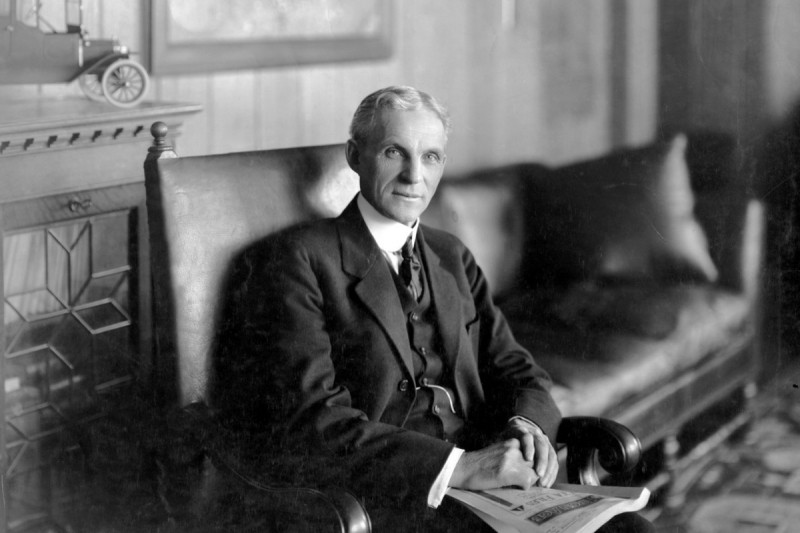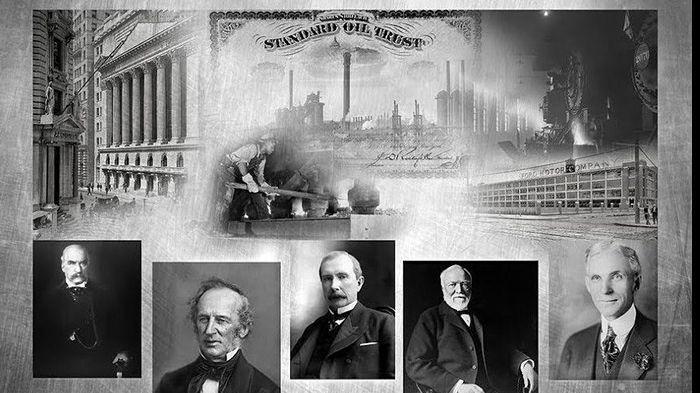10 Business Lessons from "The Builders of America"

1. Understand the power of the crowd
In the book How I Lost My Virginity, Richard Branson talks about how his children helped him understand trend changes. With this knowledge, he understood the shift from game consoles to music devices. The crowd can inspire innovation across many industries. The crowd often inadvertently or intentionally gives signals for changes in demand, fashion preferences, or cultural trends. Recognizing these signals will help entrepreneurs know which direction is right, guiding their businesses forward. Even top brands like Louis Vuitton and Coca-Cola understand the power of the crowd and create new products that align with trends while maintaining their identity and brand characteristics. In this business market, consumers will come and pay for a product that is fashionable and stylish.
2. Be wise and innovative
John D. Rockefeller was an outstanding entrepreneur who introduced techniques that completely reshaped the oil industry. In the mid-19th century, the demand was primarily for kerosene. However, during the refining of crude oil into kerosene, many by-products were discarded. While others saw it as waste, Rockefeller saw it as treasure. He sold a by-product, paraffin oil, to candle manufacturers and another by-product, petroleum jelly, to medical supply companies. He was smarter and more agile than his competitors. Rockefeller also negotiated discounts or rebates from the railroad companies transporting his oil. He used all these methods to lower oil prices for consumers. His profits quickly soared, and competitors were defeated one by one. Rockefeller also forced smaller companies to sell shares back to him, thus building a powerful empire.
3. Mentorship
Great business leaders were all once excellent students. Mentorship is about following someone with more experience in your field to learn knowledge. There is nothing shameful about being a student of someone. Before you can lead, you need to learn and be guided. Learn the startup secrets, the secrets to facing and overcoming challenges from your mentor. Andrew Carnegie was a student of Thomas Scott, a businessman and railroad executive, and Plato studied under Socrates, the great Greek philosopher.
4. Resilience
They are very resilient when facing challenges. More than knowledge, experience, or skills, the level of resilience will determine who succeeds and who fails. Cornelius Vanderbilt, who once owned the Harlem Railroad, faced conflicts in connecting rail lines. But in every case, the conflicts ended with him winning.
5. Don't force yourself to create something new
When you want to create something, don't limit yourself too much to creating something completely new and different. Consider what has been done before and try to create something better from what is available. When redoing something that already exists, be creative, clever, and innovative. You don't need to be as smart as Einstein. Just improving the current situation a little is enough.
6. Think long-term
Foreseeing the future is not essential for making money but is necessary for becoming wealthy. You can solve today's problems and make money, but if you can solve a problem that no one has recognized yet, you will become rich. A business that can impact the future will take a step closer to wealth. You don't need to own a business with a target market for the future, but this vision will create an advantage for your business. Imagine: I research the market and realize that in the near future, the demand for palm oil will increase due to changes in global economic policies towards agriculture. I invest capital to develop palm plantations. After about 15-25 years, when agriculture booms, imagine how profitable those plantations will be.
7. Build relationships
Cornelius Vanderbilt once faced an important choice in business. He realized that the future of the railroad industry did not lie in building more tracks but in transporting goods. Vanderbilt needed a new business project that would not only help him continue his business but also give him an advantage over competitors. Similarly, with the rising demand for kerosene, John D. Rockefeller also needed a means of transportation for his product. These two individuals collaborated to help each other. Rockefeller was transported kerosene at a low cost, and Vanderbilt always had goods to transport. It was a win-win outcome.
8. To be wealthy, "scratch where it itches"
To start a business, research a need and provide solutions to meet that need. People need affordable yet quality cars; Henry Ford provided them with such products. People wanted a safe source of light at night; John D. Rockefeller provided kerosene. The Navy needed steel to build submarines, and companies needed steel; Andrew Carnegie met their needs perfectly. Help people solve their customers' needs, and they will buy your products.
9. Respect your competitors but do not fear them
Just because you are in business does not mean you can completely dominate that field. Competitors will certainly emerge. If you are running a business with many strong competitors in the industry, do not panic but respect and learn from them. If you fear your competitors, you are at a disadvantage. Respect your competitors, study their strengths and weaknesses, and offer better and more suitable product packages for consumers. John D. Rockefeller figured out how to eliminate railroads from the business by transporting oil through pipelines instead of by rail. Thomas Scott (who owned the railroad transporting from John D. Rockefeller's oil refinery in Pittsburgh) decided to build his own oil pipeline to connect Pittsburgh and New York, creating a strong competitive advantage and meeting Rockefeller's need for transporting kerosene. What did John D. Rockefeller do to defeat his "emerging" competitor? He completely shut down the oil refinery in Pittsburgh. This was indeed a shock to Thomas Scott.
10. Effort and determination
This point needs no further explanation. To achieve success, one must sweat, bleed, and cry. The efforts of an entrepreneur will elevate the business from a startup to a global brand. Effort and determination are key factors in achieving success.
Business Lessons from Famous CEOs Around the World

1- Bill Gates – former CEO, founder of Microsoft Corporation
Bill Gates is known as an entrepreneur, billionaire, and world-renowned philanthropist. He is the founder of Microsoft Corporation. Bill Gates started from scratch. He entered the software industry at the age of 20. By the age of 31, he became one of the youngest billionaires in history. At 37, he became the richest person in America and received the National Medal of Technology. By 39, he had become the richest person in the world. In his leadership role, Bill Gates left many valuable business lessons such as: Instead of sitting there dreaming, get to work. A positive spirit will take you further. Have faith and always be curious because he believes that one must learn throughout life. Therefore, he often reads about 50 books a year. Don't dwell on past mistakes but learn from them. Strive to stand firm and rise from failures. Always seek and hire the smartest people in the computer industry, as they are the key factors that help the business grow. Build a company consisting of many small units. However, always maintain the independence and dynamism of the small companies while still leveraging the financial resources, marketing systems, and strategic direction of the larger company. This helps increase competitiveness within the company and fully exploit the strengths of the small companies.
3- Steve Jobs – Former CEO of Apple
Steve Jobs was the co-founder, Chairman, and CEO of Apple Inc. He is also known as an inventor, designer, and entrepreneur. Steve made significant contributions to Apple's success with standout products such as the iPhone, iPod, iPad, and Macbook. He is also recognized as one of the pioneers in the personal computer and smartphone revolution. Although he was not an engineer, could not write even a line of code, and did not graduate from college, he left many valuable business lessons: Success comes from perseverance in the face of numerous failures. In fact, those failures helped him come up with many new ideas. Create a market for the product: Steve did not believe in market research documents. He believed that "consumers don't even know what they want until we create it." Know how to improve existing ideas: You cannot always be the leader in product development. However, with good vision, you will recognize what will impact the market and have the ability to reshape ideas, making them market-dominating. Sell simplicity: Steve hated complexity. For him, simplicity was always the top priority. Therefore, simple and easy-to-use designs created a clear distinction between Apple's products and others. Build an empire of talented people: Steve Jobs was famous for valuing talent hunting. Therefore, once he identified the right person, he would personally persuade them to join.
